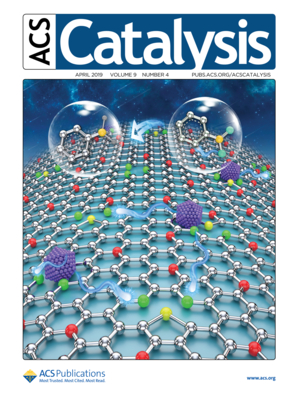| Congratulations to Zhiyan He, Baoqiang Dong, and Wenli Wang! Their work is published in ACS Catalysis. |
Congratulations to Zhiyan He, Baoqiang Dong, and Wenli Wang!Their work entitled Elucidating Interaction between Palladium and N-Doped Carbon Nanotubes: Effect of Electronic Property on Activity for Nitrobenzene Hydrogenation has been published in ACS Catalysis as a cover paper. ABSTRACT: Nitrogen dopants of carbon materials remarkably improve the stability and tune the catalytic performance of supported metal nanoparticles. However, it is still controversial how the Pd–N metal–support-interaction (MSI) influences the catalysis. Herein, the density function theory (DFT) calculations and X-ray photoelectron spectroscopy (XPS) were combined to rationalize the Pd–N MSI. DFT calculations suggested that Pd adsorbs on N-doped carbon nanotubes (N@CNTs) and donates electrons to pyridinic nitrogen. It was further experimentally proved using XPS through a titration method by gradually increasing Pd content or changing the N content of support by a postheat-treatment. The Pd catalysts display electron-deficiency depending on the intensity of MSI between Pd and pyridinic nitrogen, measured by Pd 3d binding energy. It paves the way to the rational synthesis of Pd catalysts with a tunable electronic state for the targeted catalytic reaction. Using the hydrogenation of nitrobenzene as the probe reaction, it was revealed that the reaction activity can be facilely tuned by the Pd–N MSI, due to the strong adsorption of nitro-groups on electron-deficient Pd nanoparticles.
Cite: Zhiyan He, Baoqiang Dong, Wenli Wang, Guangxing Yang, Yonghai Cao, Hongjuan Wang, Yanhui Yang, Qiang Wang*, Feng Peng, Hao Yu* Elucidating Interaction between Palladium and N-Doped Carbon Nanotubes: Effect of Electronic Property on Activity for Nitrobenzene Hydrogenation, ACS Catalysis,2019,9,4,2893-2901 |

